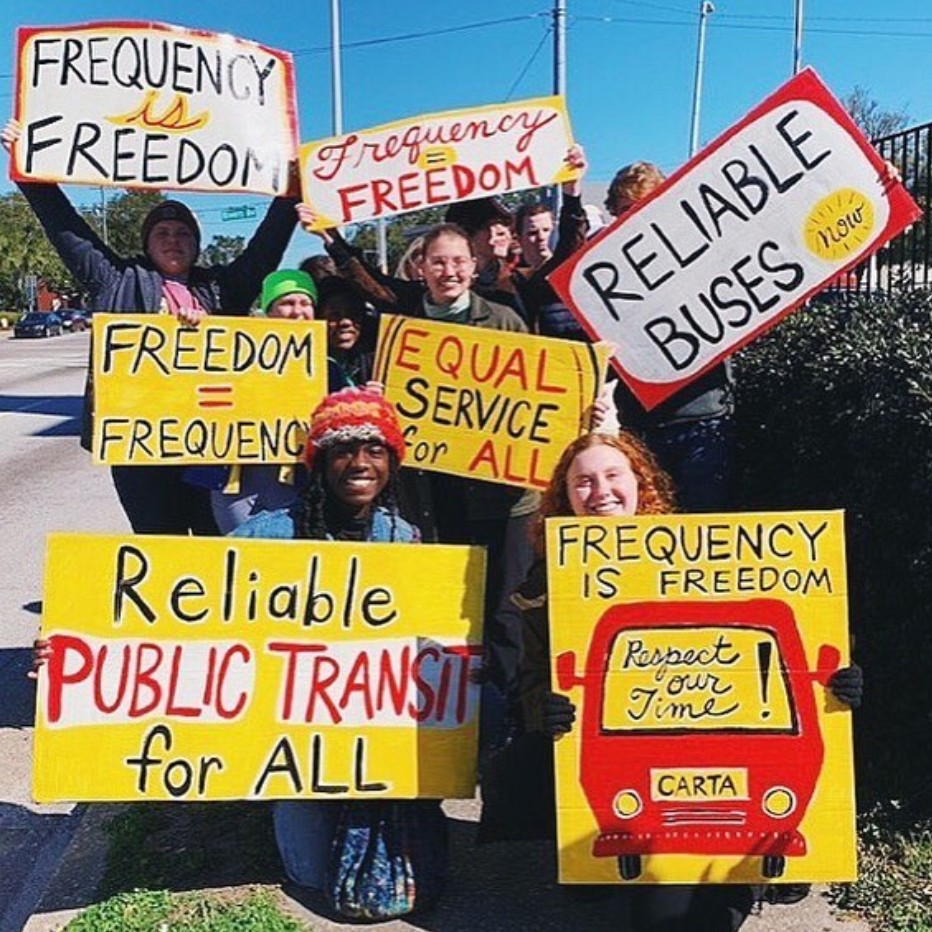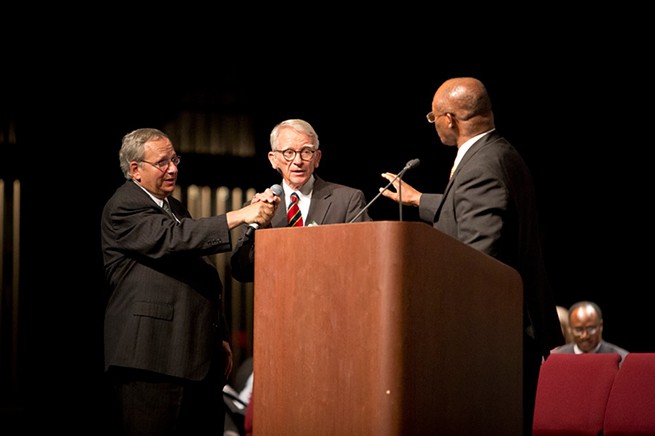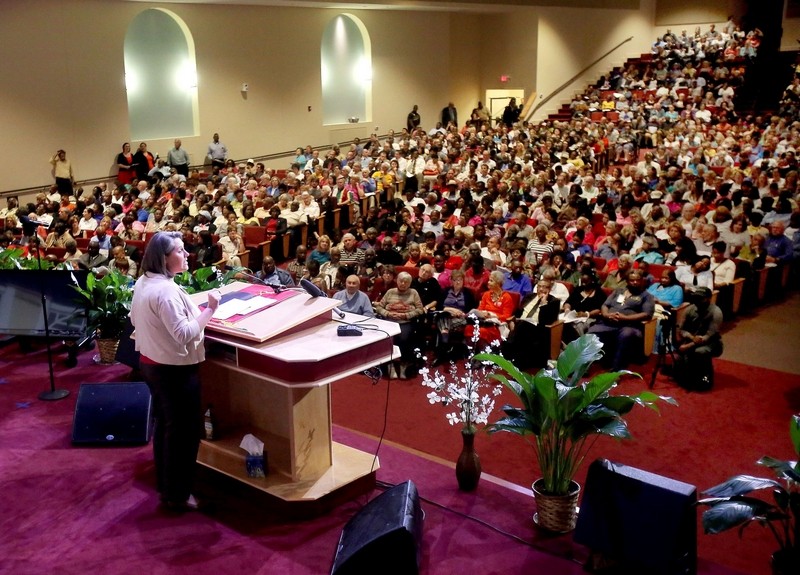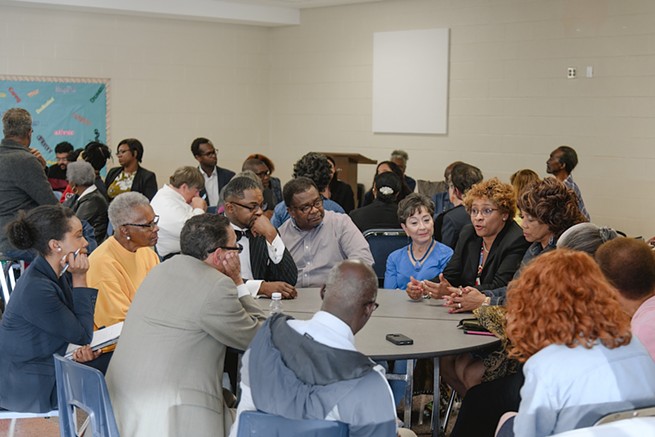CAJM
Charleston Area Justice Ministry
Background
What is CAJM?
The Charleston Area Justice Ministry (CAJM) is a growing network of faith-based congregations and other community organizations who come together with one goal: to make the Charleston area more just. We are culturally, economically, geographically, and religiously, diverse. Together, we speak with one powerful voice for justice for our community. We accomplish this by doing research, educating the public, and publicly addressing the root causes of, and solutions to, poverty and injustice in our communities. CAJM’s unique approach transforms systems that cause suffering by encouraging local officials to use best practices and holding them accountable when they do not.
Current Membership
Bethel Presbyterian Church, Johns Island
Blessed Sacrament Catholic Church, Charleston
Calvary Baptist Church, Charleston
Calvary Episcopal Church, Charleston
Central Mosque of Charleston, Charleston
Charity Missionary Baptist Church, North Charleston
Church of the Holy Communion, Charleston
Circular Congregational Church, Charleston
College of Charleston, Charleston
Edisto Presbyterian Church, Edisto Island
First Scots Presbyterian Church, Charleston
Grace City Church, Charleston
Greater Goodwill AME, Mount Pleasant
Hebron Zion Presbyterian Church, Johns Island
Kahal Kadosh Beth Elohim, Charleston
Lutheran Church of the Redeemer, Charleston
Masjid Al Jami Ar-Rasheed, North Charleston
Morris Brown AME Church, Charleston
Morris Street Baptist Church, Charleston
Mount Moriah Missionary Baptist Church, North Charleston
Mount Pleasant Presbyterian Church, Mount Pleasant
Mount Zion AME Church, Charleston
New Tabernacle 4th Baptist Church, Charleston
Nichols Chapel AME Church, Charleston
North Charleston United Methodist Church, North Charleston
Parkside Church, Charleston
Project L.O.V.E., North Charleston
Providence Church, Daniel Island
Rehoboth Full Gospel Church, North Charleston
Solid Rock Christian Fellowship, Charleston
St. Andrew’s Presbyterian Church, Charleston
St. James Presbyterian Church, Charleston
St. John Catholic Church, North Charleston
St. Mark’s Episcopal Church, Charleston
St. Matthew Baptist Church, North Charleston
St. Matthew’s Lutheran Church, Charleston
St. Patrick Catholic Church, Charleston
St. Paul Missionary Baptist Church, Wando
St. Stephen’s Episcopal Church, Charleston
Unitarian Church in Charleston, Charleston
Wallingford Presbyterian Church, Charleston
YWCA Greater Charleston, Charleston
About CAJM
Staff
Lead Organizer: Raynique Syas
Senior Associate Organizer: Anna Long
Associate Organizer: Amber Campbell Moore
Associate Organizer: Niki Van Aller
What we do
Our Impact
CAJM’s process of bringing diverse community members together to identify systemic problems, research alternatives, and hold leaders accountable to enact solutions has strengthened Charleston since 2012.
Early Childhood Education
CAJM pressed the superintendent and Charleston County school board members to open 280 more seats for preschool education for at-risk 4-year olds and to implement a research-based reading curriculum. Since 2013, over 1,500 children have received early childhood education who otherwise would not.
School-to-Prison Pipeline
Removing students from the classroom for behavioral problems does not solve but exacerbates behavioral issues and makes our schools less safe. The strains of the COVID-19 pandemic only intensified this and other disparities. In Charleston County, suspension rates skyrocketed: in some schools as many as 50% of the student body were suspended. If you were a black student in Charleston County, you were more than six times more likely than a white student to be suspended or arrested in school. CAJM obtained commitments from the superintendent and school board to train all schools in Positive Behavioral Interventions and Supports (PBIS) and to begin implementation of restorative practices to teach students, teachers, and staff how to resolve conflict and build relationships. To date, all 87 Charleston County schools have implemented PBIS, 4 schools and over 200 teachers have been trained in and have implemented Restorative Practices. CAJM is continuing to work with CCSD to advocate and spread the implementation of Restorative practice across the district.
Since the 2022 Nehemiah Action CAJM leaders in the education committee have worked closely to press the CCSD on the commitments made. We have continued to use RP in our monthly meetings to deepen the relationship between the two groups and foster common understanding and resolutions. We have began to see fruition, The district has shared a draft of a three-year implementation plan which our steering committee is reviewing, we are consistently updated on training progress and implementation process in schools across the district, and a funding source for support and engagement has been identified and budgeted for over the next the next two years. There is still much work to do to ensure that all schools in our district share a safe learning environment, so we continue to need your help and support to ensure that the best practices are put in place.
Racial Discrimination in Policing
Charleston and North Charleston lead the state in discriminatory police stops – in fact, police stop African Americans nearly three times as often as Whites in our community. These stops are proven to erode community trust, make it difficult and unsafe for our officers to do their jobs well, and effectively create a less safe community for all. As of April 2021, the City of Charleston has conducted its racial bias audit of the police department. The independent auditor CNA held over 75 meetings with officers and over 250 meetings with community members. The audit produced a number of policy recommendations which CAJM is continuing to hold the City of Charleston accountable for implementing. CNA also conducted the racial bias audit of the North Charleston Police Department. The audit has recently been completed and just as with the City of Charleston CAJM continues to hold the City of North Charleston’s Police Department accountable for implementation of the proposed policy recommendations.
Transportation
The public transportation system in Charleston is supposed to connect people to work, school, and healthcare, but the reality stands in stark contrast. Every day around 15,000 people ride buses in Charleston, 11,000 of those people riding because they have no other transit option. Most transit-dependent people earn less than $40,000 a year, most of them are African American, most of them are women, and most of them use the bus to get to work. Even though the Charleston region is the most dangerous region in the state for cyclists and pedestrians, 13,200 people still have to walk and bike the first and last miles from their bus stops. The average wait time for buses is an hour, making it nearly impossible to do anything but build your life around a bus schedule. In April 2019, CAJM pushed officials to change the following inequitable fare policies: charging fees to transfer buses, failing to provide a weekly unlimited pass, and preventing seniors from using their discounted fares during peak hours. CAJM also pushed officials to increase bus frequency on three major routes: the 11, 12, and 32. In August 2019 the Charleston transit authority, CARTA, passed all three of CAJM’s fare policy recommendations. In August of 2020, a proposal was put forth to increase the frequency on one of its primary routes, Route 32. This proposal passed in September of 2021 and will begin on October 3, 2021. CAJM continues to support increasing frequency on other routes and inequitable fare policies.
Environmental Justice
CAJM’s Environmental Justice campaign is fighting to save the last remaining tidal creek on the Charleston peninsula, Gadsden Creek, from being filled in for more commercial development. Gadsden Creek has historical significance as part of the predominantly Black surrounding community. We partnered with local organization, the Friends of Gadsden Creek, to push the City of Charleston to save the creek and revitalize it to health, allowing it to function to curb serious flooding in the area and serve as a beautiful community resource. At the 2022 Nehemiah Action, City Councilmembers Stephen Bowden, Jason Sakran, and Keith Waring committed to champion the effort to save and revitalize the creek. The Environmental Justice committee is continuing to work hard to gain the necessary support on City Council to save the creek.
Juvenile Justice
CAJM representatives gathered and gained commitments from a cross-section of law enforcement officials to reduce youth incarceration by implementing a Risk Assessment Instrument (RAI), which objectively determines whether to release the juvenile to a parent to await their court date or put the juvenile in jail. The RAI was implemented in four law enforcement departments (Mount Pleasant PD, Charleston PD, North Charleston PD and the Sheriff’s Office) in January 2014. During the 2017-18 school year, all the high schools received training in PBIS. The school district now has 8 coaches assisting with the implementation of PBIS. A full-time Restorative Practices Coordinator was hired and trained to initiate Restorative Practices in 5 pilot schools. Additional staff received training in 2018, for a total of 11 staff fully trained in Restorative Practices. CAJM is working closely with the school district to continue rolling out this program to additional schools.
Wage Theft
Charleston County residents and employees have their wages stolen or withheld in many ways. We learned that the process for recovering stolen wages was arduous, confusing and largely ineffective. CAJM pressed Charleston County Council members to fund the implementation of a Charleston Wage Recovery Program with SC Legal Services. The program is being expanded through Charleston Legal Access (CLA), Charleston’s first sliding scale law firm, so that workers of all income levels including undocumented workers may receive representation. Since CLA took over the program, they have recovered over $90,000 in stolen wages.
Affordable Housing
In CAJM, we believe that everybody deserves a roof over their head. We have a vision of a Charleston where “home” isn’t a privilege, it’s an inherent human right and a public good. We believe every single person, regardless of race, class, or age, deserves a safe and joyful place to lay their head down at night. Unfortunately, Charleston looks nothing like our vision. The Charleston Metro Chamber asserts that we need over 2,600 affordable units PER YEAR for the next TEN YEARS to even keep up with growth in the area. Only 10% of that is currently being built. Meanwhile North Charleston continues to lead the nation in rates of eviction, and our community struggles to recover from the ongoing COVID-19 crisis. CAJM has been pushing our elected officials, namely Charleston County Council, to fund and establish a housing trust fund, but they refuse to act. CAJM is committed to doing what we do best, and continuing to apply pressure on the members of Charleston County Council, and finally get an affordable housing trust fund established and funded in the lowcountry.
At the 2022 Nehemiah Action, CAJM called on Charleston County Council to fund an affordable housing trust fund. In attendance were County Council members Henry Darby, Rev. Kylon Middleton, and Robert Wehrman. Each council member was asked if they would be willing to support and champion an effort to fund a housing trust fund with $10 million received from the ARPA Funds. All of the Councilmen were in support in various ways with Councilman Darby stating he would push for $20 million. The County Council has now set aside $20 million and is in the process of finalizing the Housing Our Future comprehensive strategic plan.
Access to Primary Healthcare
Over 100,000 people living in Charleston County are uninsured. The demographics of the uninsured are alarmingly skewed towards racial minorities, with 39% of Hispanic/Latinx community going without insurance and 13.2% of Black community compared to just 8.7% of the white community. This directly impacts health outcomes; on average, 28% of uninsured people postpone seeking care for a serious condition versus just 5% of insured people. And thousands more in the Lowcountry struggle to access primary healthcare because of barriers related to cost, access, and a lack of trust in the medical system.
After months of research, CAJM’s healthcare committee proposed a solution: for the Medical University of South Carolina (MUSC), the Lowcountry’s public hospital, to fund two mobile health units for the local Federally-Qualified Healthcare Center (FQHC), Fetter Healthcare Network. Fetter’s mobile health units bring affordable primary care directly into communities that struggle to access traditional doctor’s offices, providing medical homes and lifesaving care to traditionally-underserved communities. Fetter has also spent years building relationships with these communities, making them a uniquely-trusted primary care provider in the region.
At the 2021 Nehemiah Action, CAJM asked MUSC Board of Trustees Member Dr. Melvin Brown to champion the mobile unit proposal. He agreed. CAJM members also sent thousands of emails to MUSC’s CEOs requesting a meeting to present the proposal. Within days of the Nehemiah Action, MUSC’s CEOs reached out to CAJM leaders to schedule an initial meeting. As a result of CAJM’s advocacy, MUSC and Fetter have signed an affiliation agreement that allows them to increase access to healthcare among underserved communities by creating patient referral patterns between the two institutions, and allowing them to work on joint initiatives. Examples of some of these initiatives include re-establishing the MUSC Mammogram Van and running joint vaccine clinics. This partnership has also laid the necessary legal groundwork for MUSC to fund two mobile units for Fetter. On August 27, 2021 MUSC leadership stated in the Post & Courier that “[MUSC is] pursuing funding strategies and partnership opportunities for new mobile units in our area with Fetter […]” CAJM is continuing to meet with MUSC to ensure that the mobile units are funded.
Policing
We are meeting with key council members to continue to move work forward, and aim to have important conversations to summarize for voter education for upcoming election cycles. We recently decided to build out two steering sub committees for the different jurisdictions. In North Charleston we continue our work of Police accountability by working with a local coalition to bring forward information that led up to the decision to invest in a police surveillance Joint Operations Center, and are pressing to get access to the policies around data collection, use, and storage as well as its impact on our local community.









